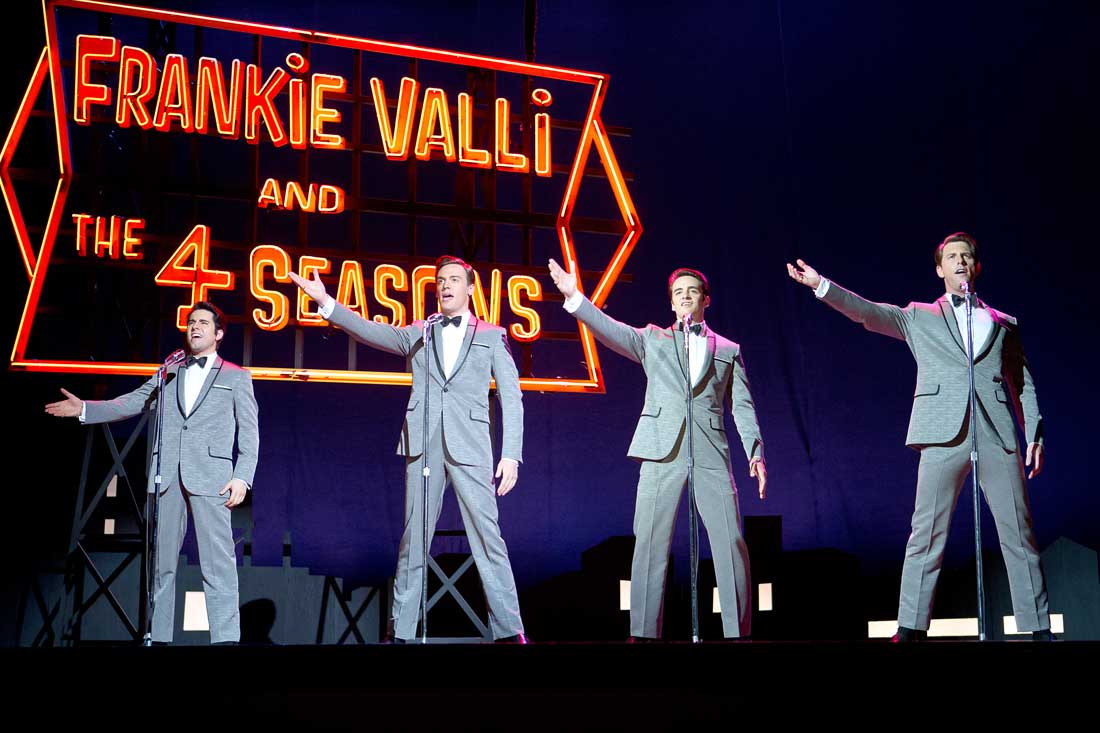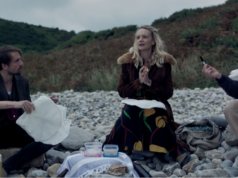There are tons of reasons why the movie version of Jersey Boys shouldn’t work. Most of them have to do with director Clint Eastwood. Anyone who’s seen the Broadway musical about Frankie Valli & The Four Seasons knows that it’s a high-energy show, whereas Eastwood has one of the lowest pulse rates of any major Hollywood filmmaker. True, Eastwood has a musical background and grew up listening to the wildly successful band, which rivaled The Beatles in popularity during its time. However, musicals tend to reward filmmakers with panache and dazzle and a willingness to innovate, none of which Eastwood has ever been about as a filmmaker.
So I’m rather amazed to report that Eastwood delivers his best directing job in 20 years on this movie and does it without radically changing his style. In fact, only my regard for Unforgiven keeps me from naming this as his best movie ever.
Much like the musical, the movie has band members turn to the audience at various points and provide narration. When the story picks up in Belleville, N.J., in 1951, fast-talking neighborhood hustler Tommy DeVito (Vincent Piazza) is busy trying to scrape a band together out of local musicians like Nick Massi (Michael Lomenda) and Francis Castelluccio, a.k.a. Frankie Valli (John Lloyd Young), a 16-year-old with an unforgettable falsetto voice. Despite Tommy’s efforts, the trio remains stuck, pulling off petty crimes in their mobbed-up neighborhood until they find the missing ingredient. That’s Bob Gaudio (Erich Bergen), a singer and keyboardist who’ll write their biggest hits.
The singing actors, none of whom have an extensive resumé on film, do much to carry this movie. They create the shifting group dynamic involving Tommy, who can’t stop behaving like a neighborhood hustler once he gets to the top; Bob, a business-minded type who’s much better equipped to handle success; and Frankie, who goes from wide-eyed newcomer to the man in charge. (Nick is mostly along for the ride.) Watch the late scene when the band members sit down in a mob boss’ living room and try to figure out how they’re going to pay Tommy’s gambling debts — it’s a lengthy, complicated sequence punctuated by Nick’s irrelevant comic outburst about Tommy’s personal habits, yet it doesn’t flag or lose its focus. Young originated the role of Frankie on Broadway, winning a Tony for his efforts, and he successfully scales down his stage performance for the camera as we see his Frankie being surprised and delighted at the sound of his own voice echoing inside a church during an organ-accompanied version of “A Sunday Kind of Love” and the grateful smile he cracks at the ovation that greets his triumphant first public unveiling of his late hit “Can’t Take My Eyes Off You.”
Young also leads the musical contributions from these actors, and while he doesn’t sing falsetto with Valli’s power and abandon (then again, who does?), his voice still pops off the soundtrack on “Sherry,” “Big Girls Don’t Cry,” and “Walk Like a Man.” Bergen leads the number “Cry for Me” when Bob auditions for the group, with the others eventually joining him in harmony. We know the scene is full of crap — bands don’t often magically find their sound the first time they play together — yet the song sweeps away any objections we might have.
Much like the Broadway show, the movie is weaker when it focuses on the musicians’ personal lives. Adapting their own stage work, writers Marshall Brickman and Rick Elice add some scenes to try to fix the problem. Even so, no sooner does Frankie marry his wife (Renée Marino) than she turns into a raging alcoholic without warning. Similarly, when Frankie later says his teenage daughter (Freya Tingley) has the potential to be a great singer, we have no idea whether this is true or not. This robs the subplot of the tragic impact that it’s supposed to have.
Eastwood’s direction is visually drab, too, as always. Yet the material prevents him from indulging the old-fart point of view that curdled his thriller Gran Torino and his baseball comedy Trouble With the Curve. He keeps the momentum moving forward without mistaking ponderousness for gravity, as he so often does, and the movie wears its 135-minute running time lightly. Telling the story of a rock band seems to have encouraged him to lighten up, and the result is his most purely enjoyable film to date. Let everybody else have the über-serious, Oscar-nominated likes of Mystic River and Million Dollar Baby and Letters From Iwo Jima. I’ll take the Clint Eastwood movie that ends with a big dance number set to “December 1963 (Oh, What a Night),” and I’ll have a good time doing it.
[box_info]
Jersey Boys
Starring John Lloyd Young, Vincent Piazza, and Erich Bergen. Directed by Clint Eastwood. Written by Marshall Brickman and Rick Elice, based on their musical. Rated R.
[/box_info]












